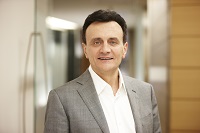 |
| AstraZeneca CEO Pascal Soriot |
Hoping to avoid Pfizer's ($PFE) megamerger pitch, AstraZeneca ($AZN) CEO Pascal Soriot promised investors today that the pharma giant has stocked up wisely on experimental drugs that will deliver tens of billions of dollars in future annual rewards. And now he's asking for enough time to deliver on that promise.
In a remarkable performance that will either go down as a zealous display of bold forecasting or a desperate, last-ditch pitch to ward off Pfizer's unwelcome embrace, AstraZeneca today promised that the experimental drugs it is now working on can deliver a "risk-adjusted" payoff of $23 billion a year. On a non-risk-adjusted basis, the pharma company assesses its sales potential at a whopping $63 billion.
Big Pharma companies are typically cautious when it comes to projecting sales on experimental drugs, if they do it at all. But pressed against the wall by an aggressive Pfizer, AstraZeneca is throwing caution to the wind, claiming magnificent futures for drugs that may never even make it to regulatory officials. In some cases, even analysts' most bullish estimates aren't good enough to reflect AstraZeneca's belief in its pipeline potential.
At the very least, AstraZeneca wants to make sure that investors will expect Pfizer to pay much more than the $106 billion-plus bid now on the table.
AstraZeneca, though, has been dogged by repeated failures in the clinic well after the departure of CEO David Brennan and R&D chief Martin Mackay. And many analysts aren't sure when the company will be able to turn around sinking drug sales and start heading back up again, let alone when it will see these spectacular returns. AstraZeneca's execs, though, can explain these numbers another day--provided they make it past Pfizer's megamerger plans.
As expected, AstraZeneca says its swift move into late-stage testing for its immuno-oncology drugs make it a leader in the field. The cream of the midstage crop was also laid out: MEDI4736, AZD9291, olaparib, PT003 & PT010 (LABA/LAMA and triple LABA/LAMA/ICS), benralizumab, and the fixed-dose combination saxagliptin/dapagliflozin.
And then AstraZeneca highlighted its next tier of top experimental drugs: AZD3293 (a high-risk BACE program for Alzheimer's), the Phase III psoriasis drug brodalumab, roxadustat, anifrolumab/sifalimumab, tralokinumab, mavrilimumab "and a broad immuno-oncology portfolio."
AstraZeneca assigned AZD3293 a shot at earning a non-risk-adjusted $5 billion in yearly sales, while some analysts range from one-tenth of that to $3 billion a year. They may as well have cited $10 billion, the usual number that some people come up with in the event an Alzheimer's drug is approved for a mass market like this. Unfortunately, there's still no real consensus on what causes the disease, let alone how it needs to be treated. And Alzheimer's has been a mine field in R&D, claiming dozens of failed programs and high-profile flops.
AstraZeneca's top sales projections:
- MEDI4736, an anti-PD-L1 drug and its top prospect in immuno-oncology, has the potential to earn $6.5 billion a year, says AstraZeneca, citing analysts' estimates of $2 billion to $7 billion.
- The monotherapy lung cancer drug AZD9291--a third-generation irreversible epidermal growth factor receptor TKI which has just been awarded "breakthrough" status by the FDA--can earn $3 billion, well over the $1 billion to $2 billion AstraZeneca says it has seen in analysts' estimates.
- Olaparib, once a failure for ovarian cancer but now in a new cancer study following a subpopulation analysis, can earn $2 billion.
- PT003/PT010 is a $4 billion prospect.
- Benralizumab is a $2 billion drug in AstraZeneca's books.
- Saxagliptin/dapagliflozin fixed-dose combination is worth a potential $3 billion.
Helping to drive this rapid increase in cash will be Brilinta, which AstraZeneca says can earn $3.5 billion a year as it pursues new postapproval studies to broaden its use. Its diabetes franchise can earn $8 billion a year by 2023 while respiratory drugs gain another $8 billion.
"AstraZeneca is completing its transformation, and now has the right size, focus and team to deliver on one of the most exciting pipelines in the pharmaceutical industry," Soriot said in a statement. "We have fostered a culture of innovation where science is at the heart of what we do and today we set out the greatly improved quality of our mid and late stage pipeline and its significant commercial potential. We are continuing to create significant value for shareholders from our independent strategy."
- here's the release